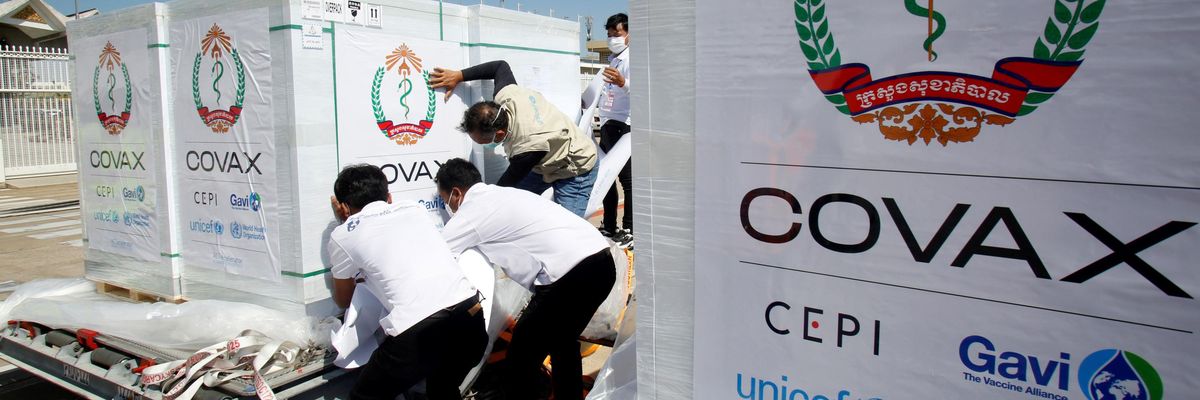Since the first coronavirus vaccines were administered in late 2020, public health campaigners have been warning that trickles of charitable donations from rich countries to the developing world will never be enough to ensure equitable, worldwide access to the lifesaving shots.
Now the vehicle through which many such donations have flowed--Covax--is reportedly out of money, a potential disaster for low-income countries that have come to depend on the United Nations-backed initiative.
"Pfizer and Moderna are prolonging this pandemic with their greed."
The lack of funds is especially worrisome as pharmaceutical companies and the governments of rich nations continue to deny the developing world the ability to produce vaccines on their own soil.
Seth Berkley, chief executive of Gavi--the vaccine alliance that helped form Covax--told the Financial Times on Monday that Covax will no longer be able to accept new dose donations that come without syringes or other components because it doesn't have any cash left to afford such items, which donor countries often don't provide.
Asked how much money the project has left, Berkley answered bluntly: "None."
Combined with its repeated failures to meet delivery targets, Covax's financial woes added fuel to the argument that a vaccination effort reliant upon the charitable whims of rich countries and profit-seeking pharmaceutical companies was always destined to fall short.
"This is why the charity model of vaccine delivery cannot work. We hoarded doses, made big promises, and yet..." Gregg Gonsalves, an epidemiologist at the Yale School of Public Health, tweeted in response to Berkley's comments. "Share the technology NOW for mRNA Covid-19 vaccines."
"Pfizer and Moderna are prolonging this pandemic with their greed," he added, singling out the U.S.-based pharmaceutical companies that produce the only mRNA coronavirus vaccines on the market.
Despite benefiting massively from public funding, the corporations have refused to share their vaccine recipes with the world--and the Biden administration has thus far declined to use its legal authority to force their hands.
The companies have also lobbied aggressively against a patent waiver that would pave the way for developing countries to produce generic coronavirus vaccines without fear of legal retribution. A handful of rich nations--including members of the European Union and the United Kingdom--have sided with Big Pharma by stonewalling the proposed waiver at the World Trade Organization.
World Health Organization Director-General Tedros Adhanom Ghebreyesus said Monday that Covax delivered its billionth coronavirus vaccine dose earlier this month, and Berkley predicted in recent remarks that the next billion will roll out in the coming four or five months.
Since its inception in 2020, the vaccine delivery effort has been hindered by internal dysfunction as well as pharmaceutical companies not living up to their contractual obligations, leaving Covax with fewer doses than expected. And doses have also frequently arrived in recipient countries later than planned or close to their expiration dates, leading to significant waste.
"Don't get me wrong, Covax delivering a billion doses is a great achievement. But their aim was to deliver two billion [in 2021]," Max Lawson, head of inequality policy at Oxfam International and co-chair of the People's Vaccine Alliance, noted last week.
"In our view," he added, "the key problem is a deep lack of accountability, combined with a supine naivete by Covax leadership in response to pharma companies and rich nations. This led to overly rosy projections throughout 2021 and this is continuing today."
Berkley said last week that Covax will need $5.2 billion to fund its vaccination efforts this year, as the world continues to fight the highly transmissible Omicron variant--and looks ahead to potential new mutations in the future.
"We need this money now because we know that without it, we will face further delays in accessing and securing supplies and helping countries deliver vaccines into arms," said Berkley.
But experts and campaigners argue Covax's struggles make clear that far more ambitious action--from technology transfers to suspension of intellectual property protections to regional manufacturing initiatives--is needed to produce enough vaccine doses to meet global needs and ensure equal distribution.
Related Content
'No Hiding Behind COVAX Anymore': Critics Say Delivery Shortfall Shows Dire Need for Vaccine Patent Waiver
Jake Johnson
To date, just 9.7% of people in low-income countries have received at least one coronavirus vaccine dose, according to Our World in Data. One recent analysis estimated that the world needs around 22 billion additional mRNA doses to end the global pandemic.
"The way to end a pandemic is to close the inequalities that are existing," Winnie Byanyima, executive director of UNAIDS, said during a virtual event last week. "Instead, rich countries have chosen to take a different path of expanding inequalities."
"We are not going to be out of this," she added, "until we close those inequalities."





